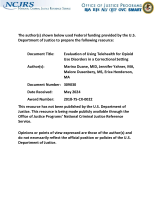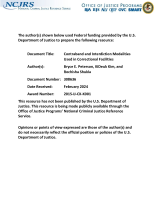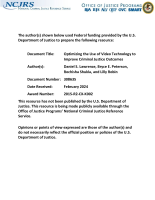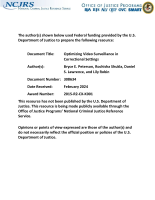Urban Institute
Issues in Contracting for the Private Operation of Prisons and Jails
Issues in Contracting for the Private Operation of Prisons and Jails - Executive Summary
Securing Officer Buy-in When a Beneficial Technology Increases Workload: Best Practices for Implementing Gunshot Detection Technology
Optimizing Public Surveillance Systems for Crime Control and Prevention: A Guide for Law Enforcement and their Municipal Partners
An Evaluation of Crime Victim Compensation in West Virginia: Part of a National Study of Victim Compensation Program
NORC Research Brief: National Study of Victim Compensation Programs Barriers and Challenges to Compensating Victims of Crime
An Evaluation of Crime Victim Compensation in New York: Part of a National Study of Victim Compensation Programs
NORC Research Brief: National Study of Victim Compensation Programs Findings and Recommendations
NORC Research Brief: National Study of Victim Compensation Programs Perceived Fairness of Outcomes Among Claimants
An Evaluation of Crime Victim Compensation in Delaware: Part of a National Study of Victim Compensation Programs
An Evaluation of Crime Victim Compensation in Arizona: Part of a National Study of Victim Compensation Programs
Assessing the Implementation and Impact of Restorative Practices within a Multicomponent School Safety Approach
Randomized Controlled Study of the EMPOWER Program to Prevent Abuse and Financial Exploitation of Older Adults
Evaluation of Using Telehealth for Opioid Use Disorders in a Correctional Setting
Contraband and Interdiction Modalities Used in Correctional Facilities
Optimizing the Use of Video Technology to Improve Criminal Justice Outcomes
Optimizing Video Surveillance in Correctional Settings
Implementation Evaluation of Hate Crime Task Forces
NIJ Community Violence Intervention Research and Evaluation Training and Technical Assistance (TTA) Center
Understanding the Implementation and Impact of Credible Messenger Mentoring on Youth Across Settings
Inclusive Research: Engaging People Closest to the Issue Makes for Better Science & Greater Impact; 2023 NIJ Research Conference Plenary
This panel will discuss what inclusive research is, how to conduct it, and what issues and challenges exist about engaging in it. “Inclusive research” has its history as a participatory research method designed to ensure people closest to the issue or problem under study are authentically engaged in the research process rather than simply being “research subjects.” While community-based participatory research has begun to take on greater prominence in the criminal justice realm, such efforts are largely confined to qualitative research inquiries.
See the YouTube Terms of Service and Google Privacy Policy
2023 NIJ Research Conference Opening Ceremony
The theme of NIJ’s 2023 Research Conference was “evidence to action,” and our goal was to bring researchers and practitioners together to learn about the latest research evidence and how it can be implemented to promote safety, equity, and justice.
The opening ceremony included remarks from U.S. Attorney General Merrick B. Garland, Assistant Attorney General for the Office of Justice Programs Amy Solomon, and NIJ Director Nancy La Vigne.
See the YouTube Terms of Service and Google Privacy Policy






